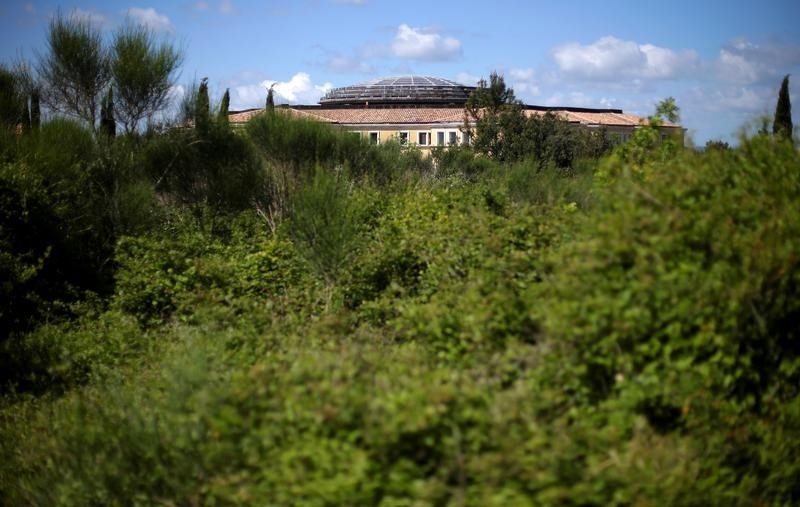Gold prices set for weekly gains on dovish Fed outlook; silver near record high
By Stefano Bernabei and Isla Binnie
ROME (Reuters) - An unfinished hotel and empty swimming pool sit sadly on the lush hillside of Pitigliano in Tuscany, where they should have welcomed the holidaymakers who flock to central Italy.
But the Tosteto spa sits even more heavily on the balance sheet of Banca Monte dei Paschi di Siena, which lent 11 million euros (£8.55 million) to the developer before declaring him in default eight years ago, and is still trying to recoup some of this cash.
Monte dei Paschi is one of the weakest banks in a sector saddled with 200 billion euros in loans unlikely ever to be paid back. These are holding back lending in the euro zone's third-largest economy and strangling growth after a three-year recession.
Prime Minister Matteo Renzi is set to approve an emergency decree later on Friday aimed at stabilising the industry by cutting the time it takes to recover debts.
Until recently, Italian banks took seven to eight years on average to recoup bad loans. That is down to three and a half, and a proposed reform could reduce that to seven to eight months by creating a fast-track system, a central bank source said.
But the Pitigliano development highlights the slog lenders still face calling in old debts, which could strengthen their balance sheets, satisfy European capital requirements, and free them up to lend.
Monte dei Paschi, which declined to comment for this article, seized the spa in 2010, according to a local court document.
Six auctions have failed to attract a buyer, partly because the original developer still holds rights to the land.
Pitigliano's mayor, Pierluigi Camilli, described the abandoned hotel as a "relic".
"It is there deteriorating because we cannot find a way to give it a future," Camilli said. "When the permits (to develop) were issued it looked like it could boost the local economy."
WEAK BANKS
Long plagued by low profitability, weak governance and high costs, any further risks to the stability of Italy's banks could hinder the euro zone's bid to get over a debt crisis that has haunted it since 2009.
A small reduction this year in the bad loans that built up in the downturn has been thanks to some lenders managing to sell non-performing loans, the Bank of Italy said, underlining how important these sales are.
Around 66 percent of Monte dei Paschi's 10 billion euros in bad debts are secured by property like the Tosteto spa, which it can seize and sell to avoid losses if clients stop paying.
But these guarantees are worth little unless someone will buy the property.
Sergio Gambassi, the original developer at Tosteto, said he never went bankrupt but Monte dei Paschi changed the terms of the mortgage and asked for money earlier than he expected.
He said he sold his house by the sea and looked in vain for other funding. "I squeezed myself like a lemon," he said.
Renzi's new decree is expected to let creditors seize other assets aside from the property pledged as security for loans, while also trying to help companies avoid crises in the first place.
MARKET PRESSURE
Pressure to resolve the bad debt problem has mounted this year as bank stocks have plunged 30 percent (FTIT8300). Earlier in April, the government persuaded major banks to set up a fund to buy bad loans and subscribe to cash calls.
The head of the ABI banking association told parliament this month that making credit recovery cheaper and easier would contribute "decisively to launching the market for bad debt".
An entire section of the decree is dedicated to encouraging banks and their clients to reach agreement before starting litigation, a source close to the matter said.
The Treasury is keen to avoid the courts getting involved in credit recovery, but the Justice Ministry is more cautious and is dragging its feet, another source said.
ABI says reducing recovery times by just one year would shrink the gap between prices buyers are willing to offer for non-performing loans and what banks will accept by 10 percent.
For a seventh auction next month, the valuation for the Tosteto spa has been cut to 4.6 million euros from 8.9 million euros at its first auction. There is already an eighth auction scheduled for October, suggesting the sellers are not hopeful.
Unless someone can be found to take the whole project forward, Gambassi said, "it will stay there, a white elephant crumbling over time. The municipality won't have the money to demolish it and I don't have the money."
